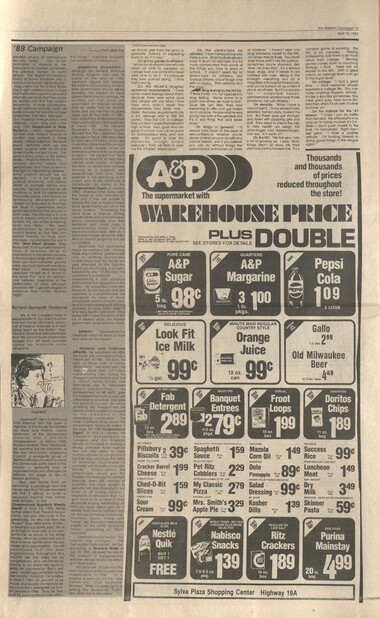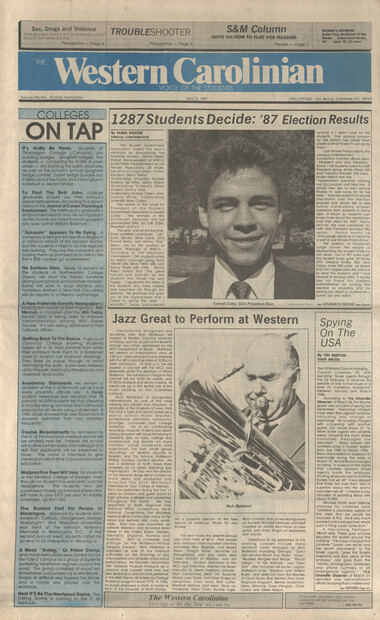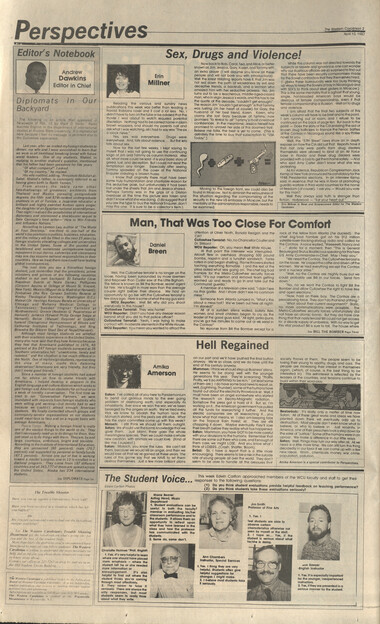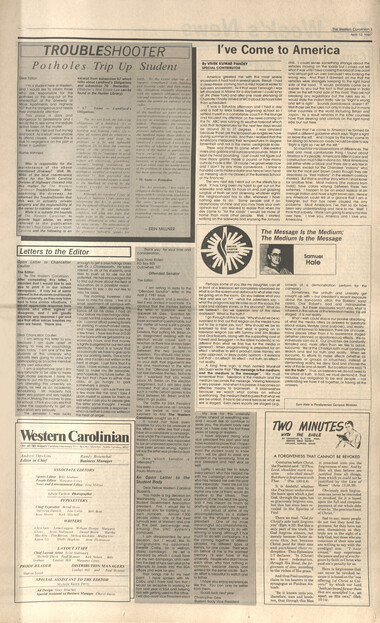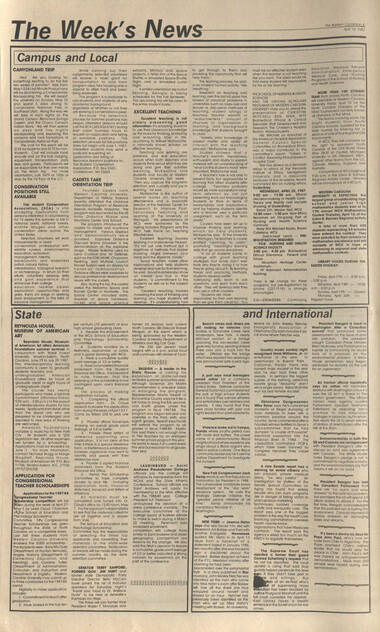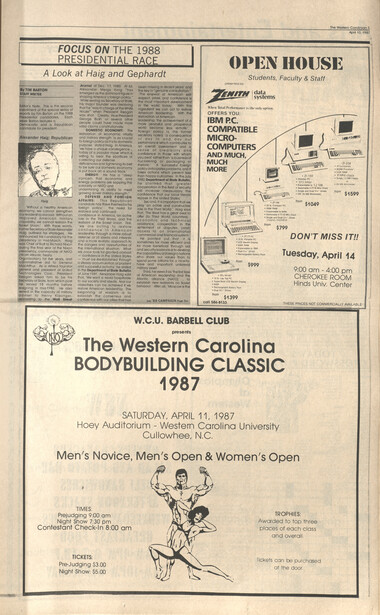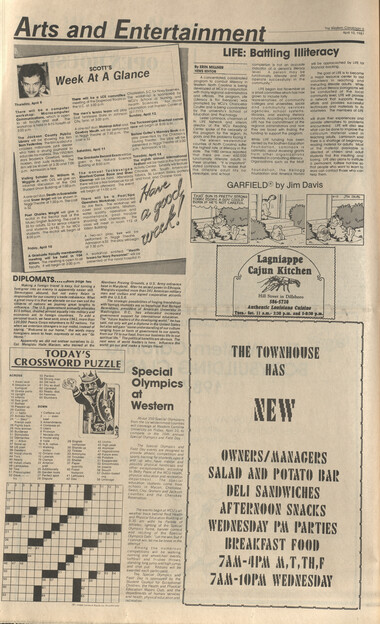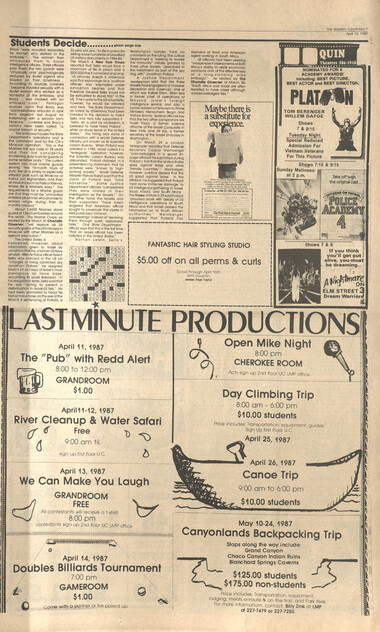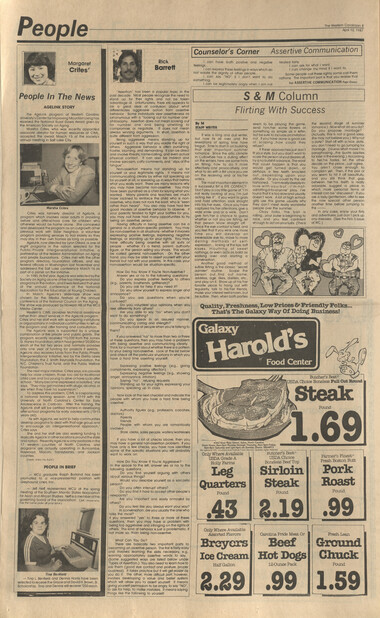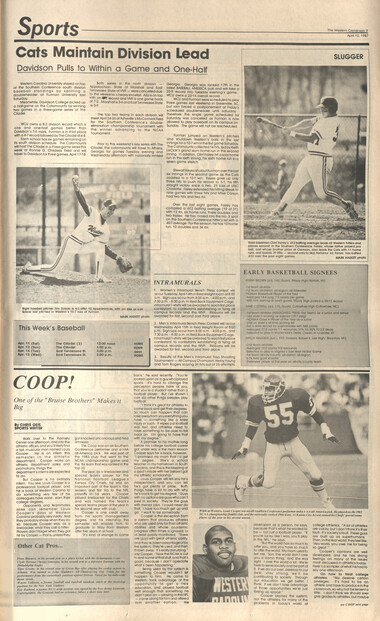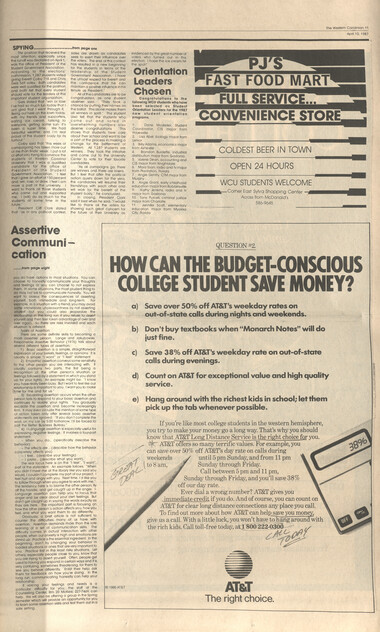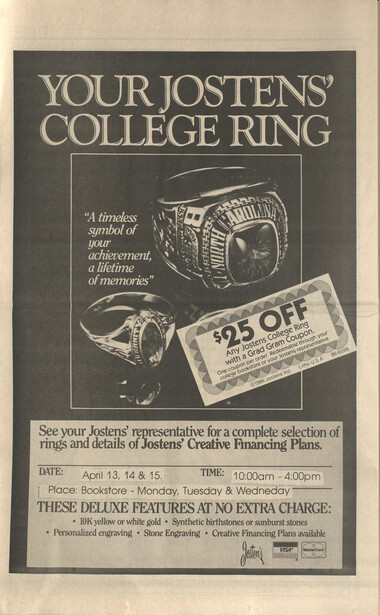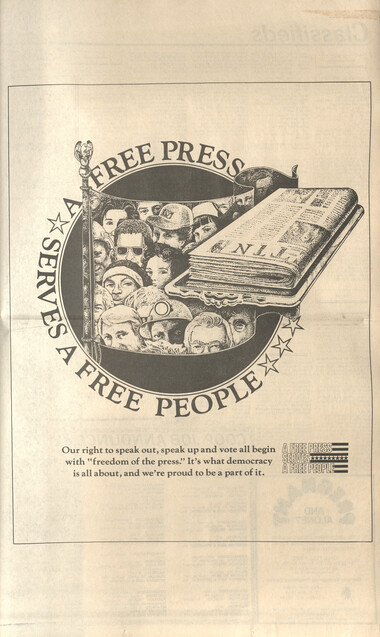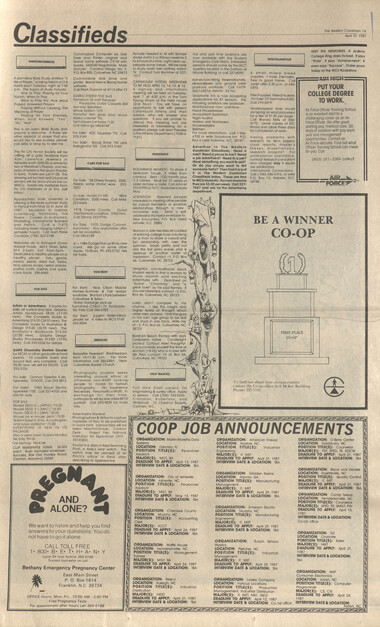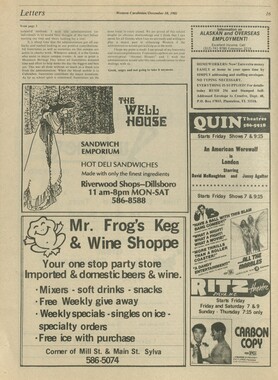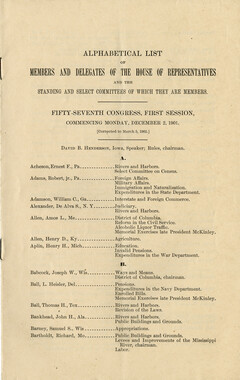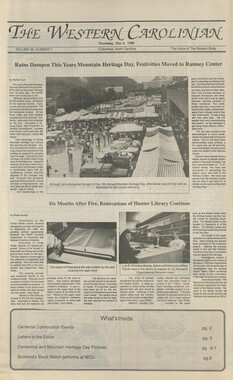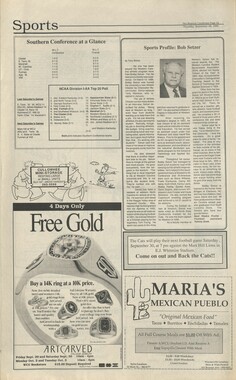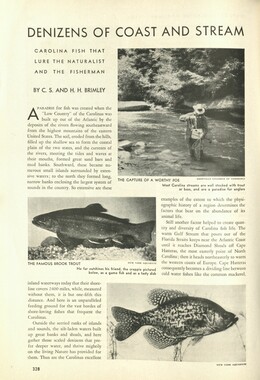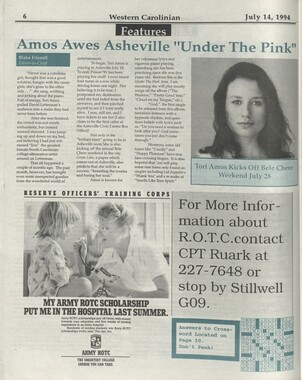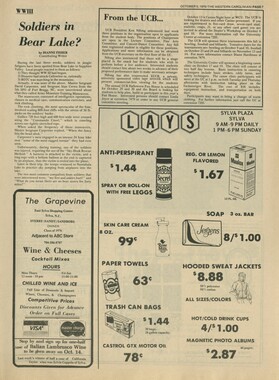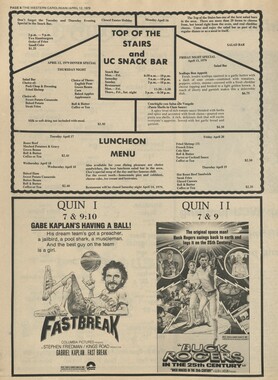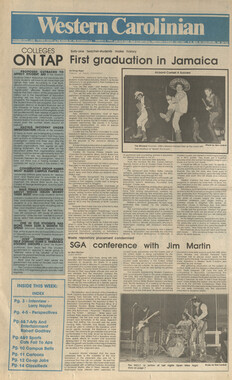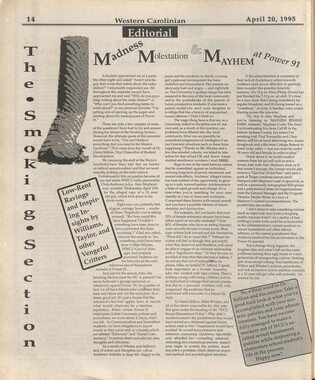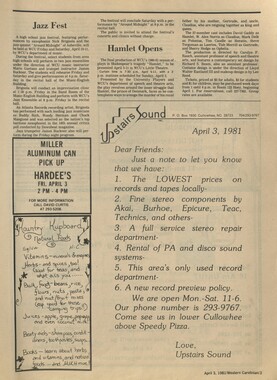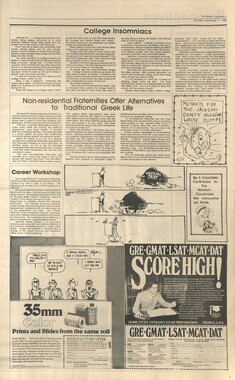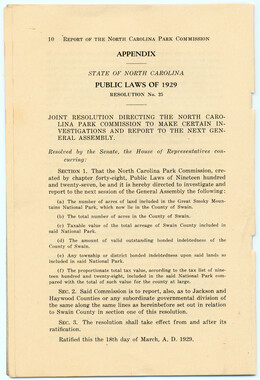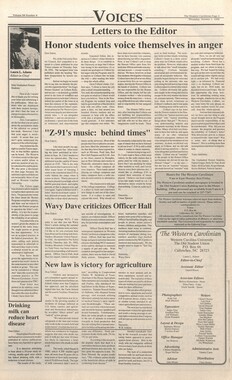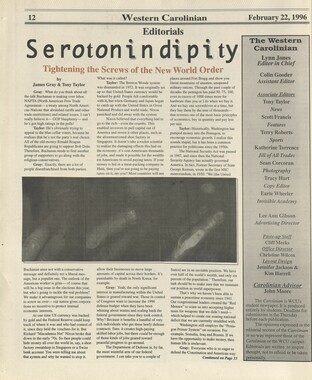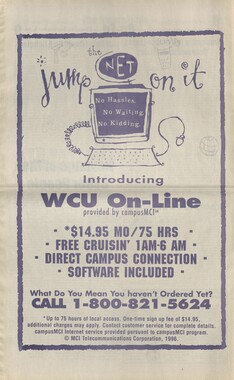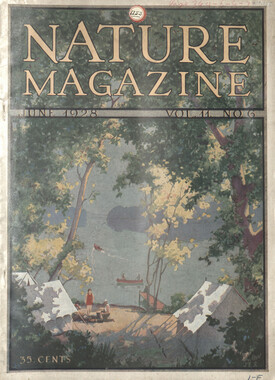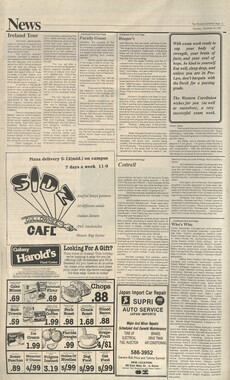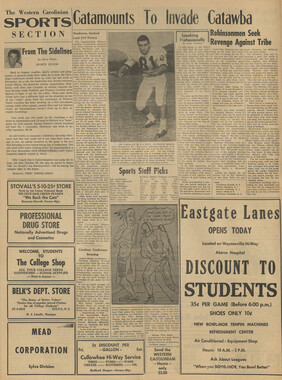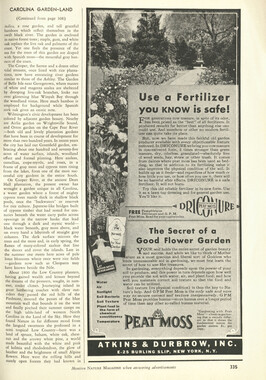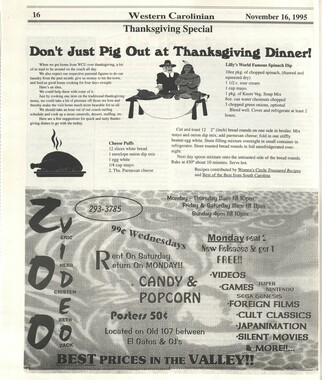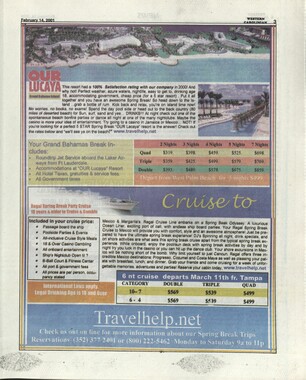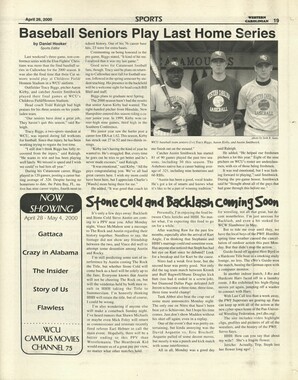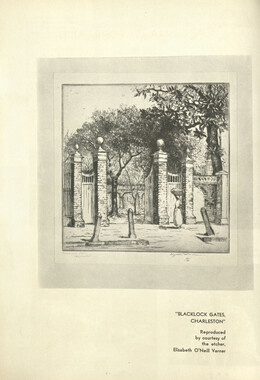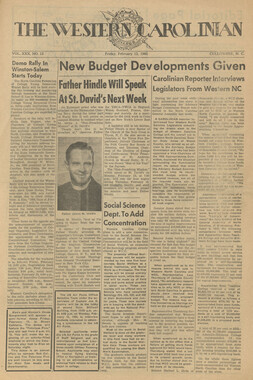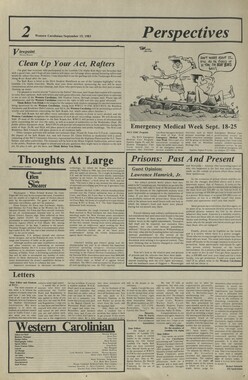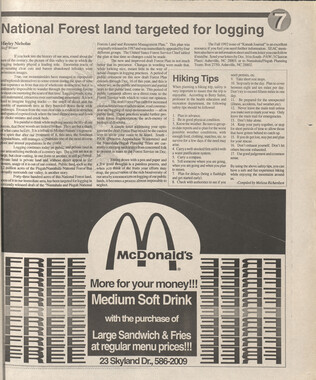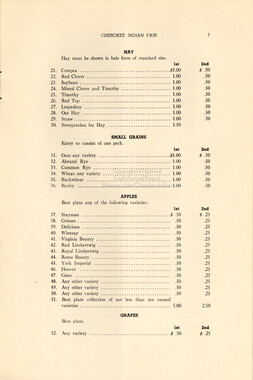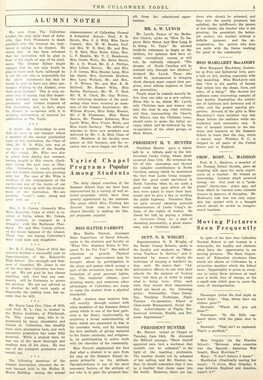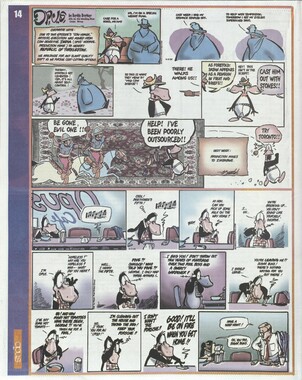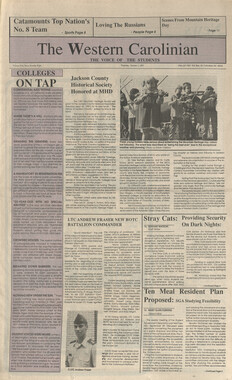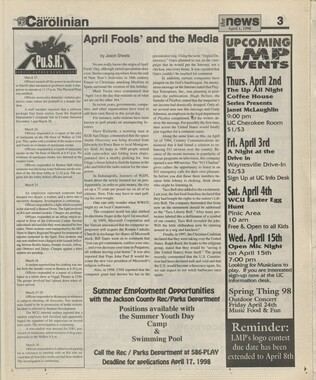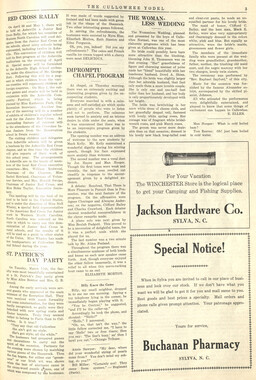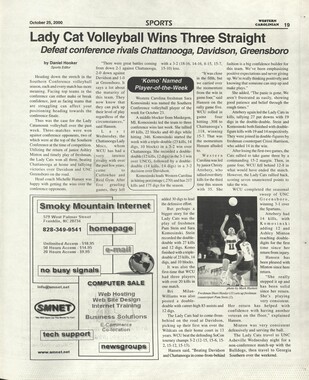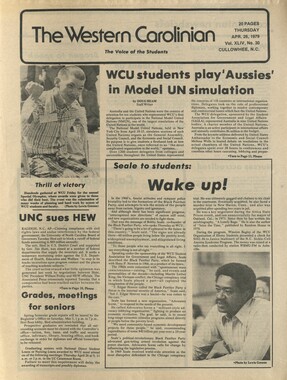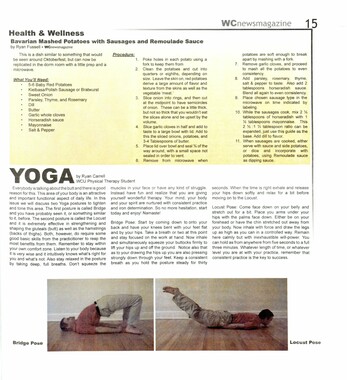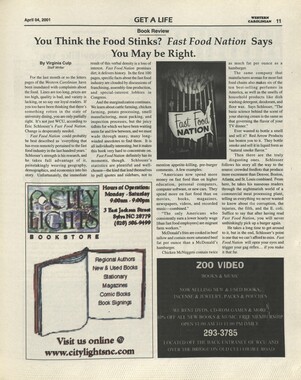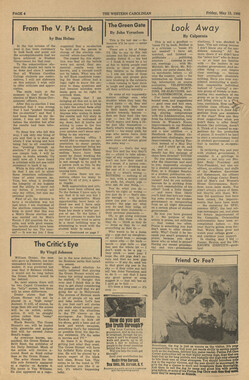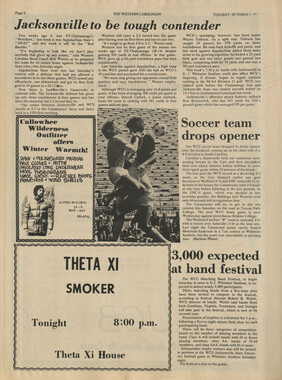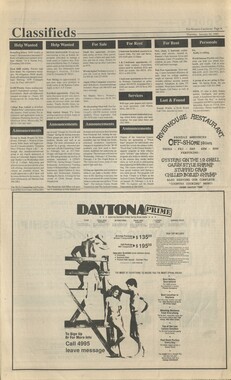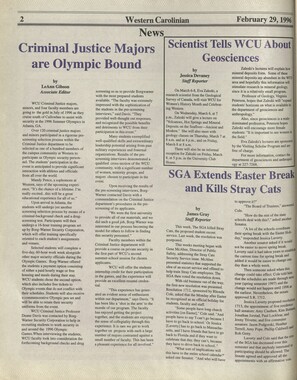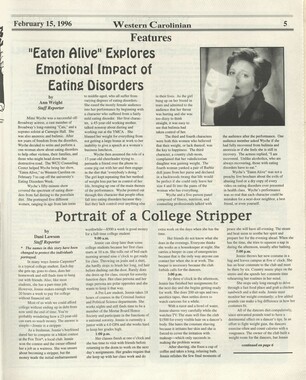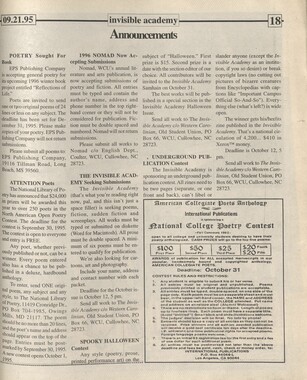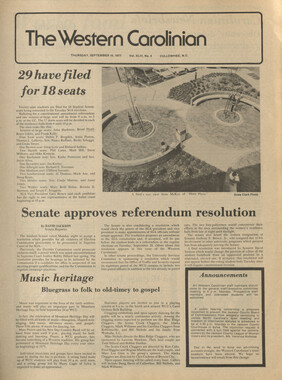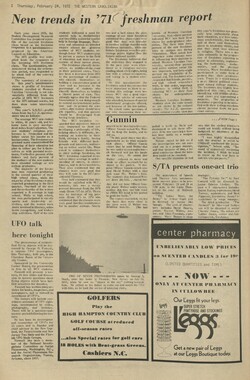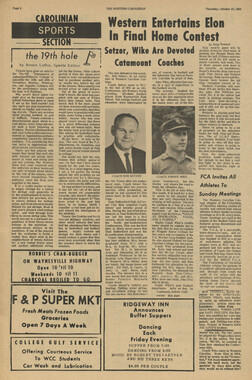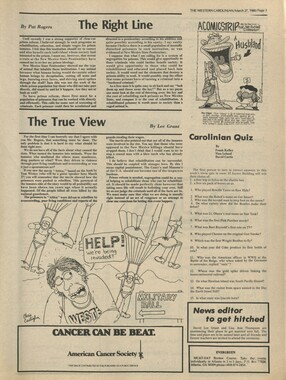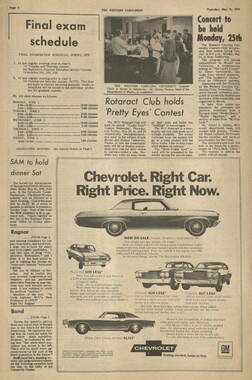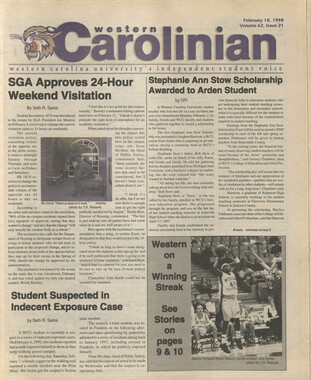Western Carolina University (21)
View all
- Canton Champion Fibre Company (2308)
- Cherokee Traditions (291)
- Civil War in Southern Appalachia (165)
- Craft Revival (1942)
- George Masa Collection (137)
- Great Smoky Mountains - A Park for America (2900)
- Highlights from Western Carolina University (422)
- Horace Kephart (941)
- Journeys Through Jackson (159)
- LGBTQIA+ Archive of Jackson County (85)
- Oral Histories of Western North Carolina (314)
- Picturing Appalachia (6797)
- Stories of Mountain Folk (413)
- Travel Western North Carolina (153)
- Western Carolina University Fine Art Museum Vitreograph Collection (129)
- Western Carolina University Herbarium (92)
- Western Carolina University: Making Memories (738)
- Western Carolina University Publications (2491)
- Western Carolina University Restricted Electronic Theses and Dissertations (146)
- Western North Carolina Regional Maps (71)
- World War II in Southern Appalachia (131)
University of North Carolina Asheville (6)
View all
- Allanstand Cottage Industries (62)
- Appalachian National Park Association (53)
- Bennett, Kelly, 1890-1974 (1463)
- Berry, Walter (76)
- Brasstown Carvers (40)
- Carver, George Washington, 1864?-1943 (26)
- Cathey, Joseph, 1803-1874 (1)
- Champion Fibre Company (233)
- Champion Paper and Fibre Company (297)
- Cherokee Indian Fair Association (16)
- Cherokee Language Program (22)
- Crowe, Amanda (40)
- Edmonston, Thomas Benton, 1842-1907 (7)
- Ensley, A. L. (Abraham Lincoln), 1865-1948 (275)
- Fromer, Irving Rhodes, 1913-1994 (70)
- George Butz (BFS 1907) (46)
- Goodrich, Frances Louisa (120)
- Grant, George Alexander, 1891-1964 (96)
- Heard, Marian Gladys (60)
- Kephart, Calvin, 1883-1969 (15)
- Kephart, Horace, 1862-1931 (313)
- Kephart, Laura, 1862-1954 (39)
- Laney, Gideon Thomas, 1889-1976 (439)
- Masa, George, 1881-1933 (61)
- McElhinney, William Julian, 1896-1953 (44)
- Niggli, Josephina, 1910-1983 (10)
- North Carolina Park Commission (105)
- Osborne, Kezia Stradley (9)
- Owens, Samuel Robert, 1918-1995 (11)
- Penland Weavers and Potters (36)
- Roberts, Vivienne (15)
- Roth, Albert, 1890-1974 (142)
- Schenck, Carl Alwin, 1868-1955 (1)
- Sherrill's Photography Studio (2565)
- Southern Highland Handicraft Guild (127)
- Southern Highlanders, Inc. (71)
- Stalcup, Jesse Bryson (46)
- Stearns, I. K. (213)
- Thompson, James Edward, 1880-1976 (226)
- United States. Indian Arts and Crafts Board (130)
- USFS (683)
- Vance, Zebulon Baird, 1830-1894 (1)
- Weaver, Zebulon, 1872-1948 (58)
- Western Carolina College (230)
- Western Carolina Teachers College (282)
- Western Carolina University (2008)
- Western Carolina University. Mountain Heritage Center (18)
- Whitman, Walt, 1819-1892 (10)
- Wilburn, Hiram Coleman, 1880-1967 (73)
- Williams, Isadora (3)
- Cain, Doreyl Ammons (0)
- Crittenden, Lorraine (0)
- Rhodes, Judy (0)
- Smith, Edward Clark (0)
- Appalachian Region, Southern (2929)
- Asheville (N.C.) (1944)
- Avery County (N.C.) (26)
- Blount County (Tenn.) (195)
- Buncombe County (N.C.) (1680)
- Cherokee County (N.C.) (283)
- Clay County (N.C.) (556)
- Graham County (N.C.) (238)
- Great Smoky Mountains National Park (N.C. and Tenn.) (525)
- Haywood County (N.C.) (3571)
- Henderson County (N.C.) (70)
- Jackson County (N.C.) (4917)
- Knox County (Tenn.) (35)
- Knoxville (Tenn.) (13)
- Lake Santeetlah (N.C.) (10)
- Macon County (N.C.) (420)
- Madison County (N.C.) (216)
- McDowell County (N.C.) (39)
- Mitchell County (N.C.) (135)
- Polk County (N.C.) (35)
- Qualla Boundary (982)
- Rutherford County (N.C.) (78)
- Swain County (N.C.) (2185)
- Transylvania County (N.C.) (270)
- Watauga County (N.C.) (12)
- Waynesville (N.C.) (86)
- Yancey County (N.C.) (72)
- Aerial Photographs (3)
- Aerial Views (60)
- Albums (books) (4)
- Articles (1)
- Artifacts (object Genre) (228)
- Bibliographies (1)
- Biography (general Genre) (2)
- Cards (information Artifacts) (38)
- Clippings (information Artifacts) (191)
- Copybooks (instructional Materials) (3)
- Crafts (art Genres) (622)
- Depictions (visual Works) (21)
- Design Drawings (1)
- Drawings (visual Works) (185)
- Envelopes (73)
- Exhibitions (events) (1)
- Facsimiles (reproductions) (1)
- Fiction (general Genre) (4)
- Financial Records (12)
- Fliers (printed Matter) (67)
- Glass Plate Negatives (381)
- Guidebooks (2)
- Internegatives (10)
- Interviews (815)
- Land Surveys (102)
- Letters (correspondence) (1013)
- Manuscripts (documents) (618)
- Maps (documents) (177)
- Memorandums (25)
- Minutes (administrative Records) (59)
- Negatives (photographs) (6090)
- Newsletters (1290)
- Newspapers (2)
- Notebooks (8)
- Occupation Currency (1)
- Paintings (visual Works) (1)
- Pen And Ink Drawings (1)
- Periodicals (193)
- Personal Narratives (10)
- Photographs (12976)
- Plans (maps) (1)
- Poetry (5)
- Portraits (4568)
- Postcards (329)
- Programs (documents) (181)
- Publications (documents) (2443)
- Questionnaires (65)
- Relief Prints (26)
- Sayings (literary Genre) (1)
- Scrapbooks (282)
- Sheet Music (2)
- Slides (photographs) (402)
- Songs (musical Compositions) (2)
- Sound Recordings (796)
- Specimens (92)
- Speeches (documents) (18)
- Tintypes (photographs) (8)
- Transcripts (322)
- Video Recordings (physical Artifacts) (23)
- Text Messages (0)
- A.L. Ensley Collection (275)
- Appalachian Industrial School Records (7)
- Appalachian National Park Association Records (336)
- Axley-Meroney Collection (2)
- Bayard Wootten Photograph Collection (20)
- Bethel Rural Community Organization Collection (7)
- Blumer Collection (5)
- C.W. Slagle Collection (20)
- Canton Area Historical Museum (2110)
- Carlos C. Campbell Collection (462)
- Cataloochee History Project (64)
- Cherokee Studies Collection (4)
- Daisy Dame Photograph Album (5)
- Daniel Boone VI Collection (1)
- Doris Ulmann Photograph Collection (112)
- Elizabeth H. Lasley Collection (1)
- Elizabeth Woolworth Szold Fleharty Collection (4)
- Frank Fry Collection (95)
- George Masa Collection (173)
- Gideon Laney Collection (452)
- Hazel Scarborough Collection (2)
- Hiram C. Wilburn Papers (28)
- Historic Photographs Collection (236)
- Horace Kephart Collection (861)
- Humbard Collection (33)
- Hunter and Weaver Families Collection (1)
- I. D. Blumenthal Collection (4)
- Isadora Williams Collection (4)
- Jesse Bryson Stalcup Collection (47)
- Jim Thompson Collection (224)
- John B. Battle Collection (7)
- John C. Campbell Folk School Records (80)
- John Parris Collection (6)
- Judaculla Rock project (2)
- Kelly Bennett Collection (1482)
- Love Family Papers (11)
- Major Wiley Parris Civil War Letters (3)
- Map Collection (12)
- McFee-Misemer Civil War Letters (34)
- Mountain Heritage Center Collection (4)
- Norburn - Robertson - Thomson Families Collection (44)
- Pauline Hood Collection (7)
- Pre-Guild Collection (2)
- Qualla Arts and Crafts Mutual Collection (12)
- R.A. Romanes Collection (681)
- Rosser H. Taylor Collection (1)
- Samuel Robert Owens Collection (94)
- Sara Madison Collection (144)
- Sherrill Studio Photo Collection (2558)
- Smoky Mountains Hiking Club Collection (616)
- Stories of Mountain Folk - Radio Programs (374)
- The Reporter, Western Carolina University (510)
- Venoy and Elizabeth Reed Collection (16)
- WCU Gender and Sexuality Oral History Project (32)
- WCU Mountain Heritage Center Oral Histories (25)
- WCU Oral History Collection - Mountain People, Mountain Lives (71)
- WCU Students Newspapers Collection (1923)
- Western North Carolina Tomorrow Black Oral History Project (69)
- William Williams Stringfield Collection (2)
- Zebulon Weaver Collection (109)
- African Americans (390)
- Appalachian Trail (35)
- Artisans (521)
- Cherokee art (84)
- Cherokee artists -- North Carolina (10)
- Cherokee language (21)
- Cherokee pottery (101)
- Cherokee women (208)
- Church buildings (190)
- Civilian Conservation Corps (U.S.) (111)
- College student newspapers and periodicals (2012)
- Dams (108)
- Dance (1023)
- Education (222)
- Floods (61)
- Folk music (1015)
- Forced removal, 1813-1903 (2)
- Forest conservation (220)
- Forests and forestry (1196)
- Gender nonconformity (4)
- Great Smoky Mountains National Park (N.C. and Tenn.) (181)
- Hunting (46)
- Landscape photography (25)
- Logging (119)
- Maps (83)
- Mines and mineral resources (9)
- North Carolina -- Maps (18)
- Paper industry (38)
- Postcards (255)
- Pottery (135)
- Railroad trains (72)
- Rural electrification -- North Carolina, Western (3)
- School integration -- Southern States (2)
- Segregation -- North Carolina, Western (5)
- Slavery (5)
- Sports (452)
- Storytelling (243)
- Waterfalls -- Great Smoky Mountains (N.C. and Tenn.) (66)
- Weaving -- Appalachian Region, Southern (280)
- Wood-carving -- Appalachian Region, Southern (328)
- World War, 1939-1945 (173)
Western Carolinian Volume 52 Number 23
Item
Item’s are ‘child’ level descriptions to ‘parent’ objects, (e.g. one page of a whole book).
-
-
The Western Carolinian 10 April 10, 1987 '88 Campaign greatest source of international security today.' The 'Soviet promotion of violence as the Instrument of change constitutes the greatest danger to world peace.' The'regard for individual liberty at home translates into a concern for human rights abroad.' Haig insists that the United States has a right, indeed a duty, to Insist that the Soviets support a peaceful international order, that they abide by treaties, and that they respect reciprocity. A more constructive Soviet behavior in these areas will surely provide the basis for a more productive East-West dialogue.' Our 'American foreign policy and defense ... must,' Haig said in the Aug,, 1981 Department of State Bulletin, 'deter aggression, contain crisis, reduce sources of conflict, and achieve a more stable, military balance. We want equal, verifiable limits on the lowest possible level on US and Soviet theater nuclear forces.' The arms control policy of the United Slates ' must be related to the nations security needs and perspectives' and 'must be seen in the light of international realities. Arms control should be an element ... in a full range of political, economic, and military efforts to promote peace and security.' He also said that we will continue to 'work for agreements that make peace more secure by reinforcing deterrence' and 'design our proposals so that they will result in agreements which genuinely enhance the security of both sides. The vital task is to limit and to reduce arms in a way that renders the use of the remaining arms less likely. We need (.furthermore.) to design arms control treaties so that they can adapt flexibly to long term changes.' According to the July 9, 1981 Wall Street Journal, Haig thinks that 'it's in our best interest fo have a renewed sense of momentum in the peace process in the broadest sense of that term. I think you don't establish ground rules; you must deal with events as they occur' Alexander Haig describes himself as a 'liberal in the sense that' he is 'an optimist' and believes 'essentially in the perfectibility of man, although probably with a greater degree of patience than some liberals might.' Richard Gephardt: Democrat We in the Congress have a responsibility to our voters fo know how the money we vote fo spend out ot Federal revenues is in fact being spent by the States.' Rep. Richard Gephardt also explained that 'We cannot have a balanced budget and will never succeed unless we terminate some programs.' Gephardt Gephardt? He's a Democrat from Missouri who has been a member of the House Committee on Ways and Means, current chairman of the Democratic Caucus, and a 5th-term Congressman. In March, 1985, Richard Andrew "Dick" Gephardt, 46, became the first chairman of the new Democratic Leadership Council, a renegade group of elected officials who want fo move the Democratic party back to the middle — generally wary of organized labor and other special interests, but eager to rein in federal spending. Rep. Jack Kemp, R-NY, on launching a campaign from the House says that "House members' still find it difficult to build a reputation beyond their home- state borders." In the Congressional Quarterly Weekly Report of May 10, 1986, Kemp further stated that, 'There is no pro forma, one and only route fo the presidency, so why not from fhe House?' Rep. Mike Synar, D-Okla., a Gephardt supporter, said, 'We're so hungry to have one of our own, someone we know, In fhe White House.' What we (Gephardt and l) lack in name identification we can make up in organization. I'm still convinced that the best organizations throughout this country ate the ones run by congressmen, who are forced by having to run every two years to keep an organization that's well used.' Under rules adopted by the Democratic National Committee in March 1986, 80 percent of all House and Senate Democrats will be convention delegates, up from 60 percent in 1984. Thus, he "has built his surest political base within ...... from page five the House." Gephardt declared his candidacy on February 23. DOMESTIC ECONOMY: Although the General Revenue Sharing program was due to expire at the end of 1980, Gephardt argued that whereas the portion of it providing funds to State governments should not be renewed, the support for local governments should continue. He pointed out that since the enactment of revenue sharing, only six states had no income faxes and ony five had no sales taxes, but 41 had both in 1980. Also,'all but four states expect(-ed) revenues in excess of expenditures in Fiscal 1980. The National Governor's Conference figures sfiowed that the combined state surpluses In Fiscal 1980 were likely to total over $7.5 billion, which was 'more than three times the a mount states would receive under an extended general revenue sharing program.' He argued that 'fiscal restraint is essential to help bring inflation under control.' In light of the facts, he viewed state revenue sharing as a program and expenditure that was 'least essential to the well-being of the nation and to the livelihood of individuals,' as stated in the Congressional Digest of January 1980. Whereas most states have the power to raise revenues on their own if they are unable to absorb the loss of Federal funds, local governments are not In the same position. Eliminating the local share of revenue sharing 'would create serious hardships for many communities and their residents' and could haste a deteriorating effect on the economy nation-wide. After all, 'A balanced budget demands every effort to abolish programs that are not justified.' Gephardt has sponsored major fax-overhaul bills. Among these was a bill that "played a key role in drafting Democratic modifications that fhe House last year attached to the Gramm- Rudman-Hollings budget- balanciong taw." in Ihe past, "he supported constitutional amendments to ban abortions and to leave their regulation to the states." He supported a one-year freeze on Social Security and has opposed, a comprehensive bill designed fo spur a more competitive system of health care, and is co-sponsoring a bill with led Kennedy to force each state to limit total health cate costs, if the states didn't meet the terms of this bill in several years, the federal government would enforce them ENERGY: Representative Gephardt does not seem to have any views on ihis subject. DEFENSE AND FOREIGN AFFAIRS: He supported HR 4800, the Trade and international Policy Reform Act of 1986. 'We face,'he said, 'a trade crisis of historic proportions.' We have seen the 'loss of more than 1.7 million manufacturing jobs during this (Reagan) administration' and 'half a million farms forced into foreclosure due to decreased export opportunities.' His admendment to HR 4800 'gives the President the tools to deal with unfair trading practices, and gives him goals for success' as well as providing 'the President with the flexibility that is needed to respond to the problems in the international marketplace.' The most important thing about this amendment, Gephardt stated in the Aug, 18.1986 Congressional Digest, is that it 'makes fhe President accountable to Congress and the American people for his failure fo develop a strong, coherent trade agenda that not only seeks to open markets abroad for our products, but that also enhances the ability of American businesses fo compete with imports on our own shores.' Simply stated, the amendment 'would give the President the leverage he needs to leverage open the markets of countries that have sought to exclude not only US products, but those of all trading nations.' Gephardt emphasized that our goal must be to achieve a more equitable trading relationship so that our trade deficit gets on a steady track toward balance and we reduce our foreign borrowing. Germany, Japan, Korea, and Taiwan' are 'the major mercantilist culprits in fhe world economy today,' according fo "Dick" Gephardt. Gephardt proclaims that, 'The country has changed. The Democratic Party has not.' He has, according to Business Week of July 22,1985, elbowed his way to fhe forefront of congressional debates over tax reform, the deficit, and trade policy. His plans are "to become fhe new champion of the Yuppies and independents in 1988." As a leading spokesman for the "new Democrats," Dick Gephardt declares, 'What I'm really up to is getting the Democratic Party's new ideas out fo the voters.' COOP from previous page we should give them five years to graduate instead of expecting them to do it in four." On giving grades to athletes: "I know some players now who will never be able to succeed on college level and some who never were able to do it. It's because they were pushed along. I think that's wrong." On the NCAA'S tougher academic requirements: "I have some mixed feelings about them, because there were some guys who played with me when I was here who didn't meet the requirements they have now. (Note: the basic requirements are a 2.0 average and a 700 SAT score.) They did O.K. in college; they just didn't apply themselves in high school. Also, guys who are good in school may not be good on standardized tests, and vice versa. It's good to raise the standards, though, simply because I think we have to wipe out the athletes' stereo-types." On the stereo-type for athletes: "I don't always know why there is one. What football players have to learn, for example, is a lot more complicated than some of the things you have to learn in school. It doesn't seem fair to stereo-type all athletes, like football players, as just tough and with no brains. That certainly isn't the case." -o^WTdrug testing by the NCAA: "I think it's fair. I'm not opposed to drug testing. We've come to a point now where we have to test. Guys like Len Bias, they had everything to offer and got mixed up in cocaine. People said he was going t be one of the greatest, but it's a sad thing that we'll never know." On drugs in general: "It always boils down to the issue of self-confidence, whether you're aware of what you can do with you natural talents, and if you believe you can do without things like performance enhancers or coke or whatever. I haven't seen any drug problems myself in the NFL, Dut I know they're there. You never eally know until it hits the surface, sometimes you're shocked, like, Wow, he does this?' It's a serious issue, drugs, and it needs to be handled with care. Being in the limelight, everything you do is magnified a thousand times more, and you're looked on as a hero if you're an athlete. But it's in society too — corporate heads, administrators, workers have those problems, not just athletes." On steroids: "What I have is natural talent. I have worked hard, sweated, trained daily, busted my but. But these guys get stronger and faster with popping pills and stuff. They need to check the risks to their health ad weigh the advantages and disadvantages, and say, 'Is it worth it?'" On fie NFL "My first year, I did a lot of growing up. I said, 'Wow, things aren't so easy...My third year may be the hardest one. It's a constant game of surviving. The NFL is so complex. Playing professional ball tnkes a lot more aetail man college. Winning games comes down to coaching strategy, I think. There are no secrets in the NFL. With a great coach, an average team can go to the Super Bowl." On college: "I had a great time. I think everyone should experience college life. You can make anything happen, almost. It's like a fairytale sometimes. You meet great guys, have some fun, and then when it's all over, it's time to move on." On his outlook for the '87 season: "I hope I can do better thantastyear. My philosophy is as long as I'm doing my best, it's O.K. When I don't push myself to the limit, I'm concerned. Right now I feel great. I have a positive attitude. I'm looking forward to doing good things in the league again." The supermarket with Thousands and thousands of prices reduced throughout the store! PRICES EFFECTIVE APRIL S. THRU APRIL11.1987 ATA*PIN Sylva. NC WE RESERVE THE RIGHT TO LIMIT QUANTITIES. SEE STORES FOR DETAILS II UBLE QUARTERS A&P Margarine Pepsi Cola in % pkgs. 2 LITER Look Fit Ice Milk MINUTE MAID REGULAR COUNTRY STYLE Orange Juice ^w Gallo 099 1.5 Liter Old Milwaukee Beer 449 BUTTERMILK RAGU SELECTED ■ TRADITIONAL OR GARDEN STYLE Pillsbury 2 QQC BiSCUitS 'AS: OX3 -199 ■159 99* Spaghetti Sauce ; SHARP-EX. SHARP Cracker Barrel Cheese x CHEESE FOOD Ched-0-Bit Slices x BREAKSTONE Sour Cream : SELECTED FRUIT 159 2 My Classic 079 Pizza 2ur km 32 oz. btl. 1 DELICIOUS 49 Pet Ritz Q29 Cobblers ; PEPPERONI (COMBO 23 OZ. 2.99) Mazola Corn Oil ASSORTED Dole OQ0 Pineapple ^0nzO9 HIDDEN VALLEY RANCH SELECTED Salad QQ0 NATURAL JUICE Mrs. Smith's Q29 Apple Pie 3i°iO Dressing MT. OLIVE Kosher Dills 8 oz btl. Success Rice SPAM REGULAR • LOW SALT Luncheon Meat A*P • INSTANT Ory Milk 12 oz. can 46 oz. jar 1 32 oz. MACARONI • REGULAR OR THIN SPAGHETTI 39 Skinner Pasta 16 oz. box 99* "J49 349 I SPAGHETTI 59* WHEAT THINS • BETTER CHEDDAR PLUS MORE SELECTED Nabisco -JD Hi JUK5 i -fit^r? ¥ a _ 1 IB Bl ■till N, , 7.5-9.5 pkg oz. 1 Sylva Plaza Shopping Center Highway 19A
Object
Object’s are ‘parent’ level descriptions to ‘children’ items, (e.g. a book with pages).
-
The Western Carolinian is Western Carolina University's student-run newspaper. The paper was published as the Cullowhee Yodel from 1924 to 1931 before changing its name to The Western Carolinian in 1933.
-
